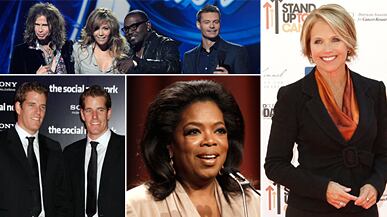What will 2011 hold for the media and entertainment industries? Will another Julian Assange or Tea Party emerge? Will there be another mega-takeover on par with Comcast’s purchase of NBC Universal? No one knows for sure, but one thing is certain: As with any year, 2011 will supply a number of memorable and unexpected media moments. As we get set to usher in the New Year, here are 10 media predictions for 2011, based on nothing more than our own unscientific assumptions. Check back at the end of the year to see how we did.
1. Google will buy a movie studio/movie library.
Continuing its efforts to legitimize (i.e., make money from) YouTube, Google in 2011 will make a major purchase of a Hollywood production studio or movie library. The search giant is already eyeing the digital rights to Miramax’s 700-film library, according to the New York Post. And YouTube is in talks to buy Web-video producer Next New Networks, the company behind such viral video hits as Obama Girl and Bed Intruder. The idea behind the effort is to monetize YouTube by positioning it as a competitor to Netflix for streaming Hollywood movies. (Google hired Robert Kyncl from Netflix in September to lead content partnerships in Hollywood.) But with $33 billion on Google’s balance sheet, why bother partnering with, say, Dreamworks Animation, when you can buy it outright?
2. NBC will develop at least one prime-time hit.
We’re going out on a limb here, especially considering the fact that outside Football Night in America on Sunday, NBC has only one show, Sing Off, that ranks among the Top 10 in total viewers. But we have faith in Bob Greenblatt, whom Comcast recently named chairman of NBC Entertainment, the second highest-ranking position in the company. Greenblatt’s ascendance follows a six-year run at Showtime, where he was instrumental in moving the network from an HBO also-ran to a legitimate contender for prestige if not ratings with such hits as The L Word, Huff, Weeds, Dexter, and Nurse Jackie. It will be a few years before Greenblatt can make NBC competitive again, and the way to do that is by getting at least one anchor show on the schedule each season. Our bet is that Greenblatt, who as an independent producer and former executive vice president of Fox was involved in the development of Six Feet Under, The X-Files, Party of Five, and King of the Hill, among others, will find a broad-based, general-interest show for a mass audience to put on NBC’s schedule next fall.

3. Discovery Communications and Scripps Networks will merge.
Cable networks are the one growth area left in traditional media, and because of that they have become highly sought after acquisition targets for the major conglomerates. As the only two pure-play cable network companies left of any size, it’s assumed that Discovery and Scripps will get taken out by one of their larger brethren—News Corp., Time Warner, Disney, or Viacom. But the truth is that Discovery and Scripps actually fit better with each other. Discovery ranks as the world’s largest nonfiction content company, with networks such as the eponymous channel, TLC, Animal Planet, and OWN: The Oprah Winfrey Network, among others. Scripps’ lifestyle channels like Food Network, HGTV, and the Cooking Channel complement Discovery’s portfolio nicely. And with Discovery’s market cap of just over $17 billion and Scripps’ roughly $9 billion market cap, the two companies are more comparable in size and more equal merger partners than the others, all of whom have market caps between $28 billion and $70 billion.
4. The Winklevoss brothers will keep trying to get more money out of Mark Zuckerberg for Facebook.
If 2010 taught us anything, it’s that the Winklevoss twins are a couple of whiny bitches. As Facebook soared past 550 million users and Mark Zuckerberg gained worldwide fame, Tyler and Cameron Winkelvoss’ cries of theft and demands for more money grew louder. Despite agreeing to a settlement of $65 million in cash and Facebook stock to drop their case alleging that Zuckerberg stole the idea for the social network from them, paidcontent.org notes that the Winkelvoss brothers have engaged in a series of “do-overs” that have kept the lawsuit alive. A San Francisco court will determine once and for all on Jan. 11 whether the settlement will stand or if the Winklevosses—Winklevi— will be able to refile their charges against Zuckerberg. Whatever the verdict, we’re sure the brothers will make themselves available to any news outlet, academic or business journal, or person with ears who wants to hear how they were the original creators of Facebook.
5. OWN: The Oprah Winfrey Network will be a ratings failure.
As powerful and beloved as Oprah Winfrey is, one person does not a network make—unless you are Keith Olbermann and MSNBC, but that’s another story altogether. Already there’s been a lot of attention surrounding the Jan. 1 launch of OWN, most of it related to the managerial, financial, and programming problems that have beset the network since its conception in 2007. It’s easy for people to “live their best life,” as Oprah’s motto goes, an hour a day, or even on their own time when they can read O magazine, but no one has the stamina to be their best selves 24 hours a day, seven days a week. And Oprah and Discovery Communications, the talk show host’s partner in the network, didn’t launch OWN for it to be a mid-tier cable channel. They want it to be B-I-G. It won’t be. Despite launching in 85 million homes, the widest distribution ever for a cable network debut, Caris & Company Analyst David Miller expects OWN to lose $25 million this year and not reach breakeven until mid-2013. On the ratings front, our bet is that OWN won’t be a top 30-rated cable network at year’s end.
6. X Factor will beat American Idol in the ratings.
Have you seen the latest promos for the new season of American Idol? We did, and we cringed watching Steven Tyler at the judges’ table telling a contestant, “Well, hellfire, save matches, f--- a duck and see what hatches!” What? We’re old-school Aerosmith fans, and even we find Tyler’s shtick tiresome. Our suspicion is that American Idol viewers will, too. And by the time The X Factor debuts in 2011, we predict they’ll be yearning for Simon Cowell’s witty retorts and unforced charisma. Though American Idol and The X Factor won’t be going head-to-head in the ratings, our bet is that the former’s ratings will continue to decline this season to perhaps the lowest level in its 10-year run, and when The X Factor does premiere, it will be to a larger audience than American Idol.
7. Carol Bartz will be fired as CEO of Yahoo.
This year marks Carol Bartz’s second anniversary as Yahoo’s CEO. She won’t make it to a third. When Bartz took over for Yahoo co-founder Jerry Yang in January 2009, the company was in disarray—it had just survived an ugly hostile takeover battle with Microsoft, the stock price was in the mid-teens, and morale was at an all-time low. A relative unknown, Bartz was embraced by Yahoo’s critics and accrued an immense amount of goodwill for her straight talk about the company’s problems. Now, however, after two years of stagnation, investors are calling for her head. No less an authority than Andrew Ross Sorkin at The New York Times wrote in early December that the “betting line is that Ms. Bartz has no more than a year” to show results at Yahoo or lose her job. Seems investors are less willing to excuse Bartz’s colorful language—she has a penchant for tossing out a few f-words during interviews—when the stock is still hovering around $16. Yahoo can forget about competing with the likes of Google, Apple, Facebook, or even Microsoft. The only hope for the company is to go private or sell out. (AOL and News Corp.’s MySpace have been frequently mentioned as potential merger partners.) But even then, Bartz is still likely to find herself out of a job by year’s end.
8. Warner Music will finally buy EMI.
Warner Music has been trying to buy EMI since 1999, when it was still part of Time Warner, but the two sides have never been able to agree on a deal. In 2011, however, Warner Music CEO Edgar Bronfman Jr. will finally land his long-coveted prize, mostly because EMI is in danger of going bankrupt. EMI owner Terra Firma is unlikely to raise the more than $100 million it needs from investors by March 2011 to avoid breaching its $5 billion of debt commitments to Citigroup. That means the investment bank will be able to take control of EMI, and since Citigroup would rather make some of its money back than actually run the record label, it is widely expected that it will try to sell EMI. This is what Bronfman expects, too, which is why he moved to London in 2009 and spent most of 2010 getting WMG’s cash and credit lines in order to make a run at buying EMI. With the music business damaged enough to no longer make the regulatory concerns that scuttled WMG’s first attempt to buy EMI in 1999 relevant, the time is right for this deal to finally happen.
9. The New York Times’ pay wall and News Corp.'s The Daily will prove that people will pay for news content digitally.
The launch of The New York Times’ metered pay wall perhaps as early as this month and News Corp.’s iPad-only newspaper, The Daily, will provide a definitive test of whether consumers are willing to pay for digital news content that they have grown accustomed to receiving for free. A recent survey conducted by the Nieman Journalism Lab found participants divided on whether the NYT’s pay-wall strategy will work, with some suggesting it will be abandoned by the end of the year. As members of the media, we’re predicting—hoping?—both efforts will have more staying power than that. Neither effort is going to be a panacea for the media industry’s ills, but we think they have a better-than-average chance at providing a sustainable digital business model for the future.
10. Katie Couric will sign a new contract with CBS—or CNN, or NBC—but honestly, who cares?
Rumors that Katie Couric was going to leave CBS have been rampant almost from the moment she signed her five-year, $75 million contract to host CBS’ Evening News. The most recent round of speculation kicked off in December with rumors that CNN was interested in signing Couric when her contract expires in May. CBS has reportedly offered Couric a new contract that cuts her salary but expands her role. And there’s always the option of going back to morning news. But with all due respect to Couric, we hope she signs a new deal soon if for no other reason than to stop media reporters from speculating about where she’s going to go. Yes, being the first woman to anchor a broadcast network evening news show was historic. Yes, Couric is undeniably likable and interesting. But is where she ends up working really worth all the ink and airtime that has been used up talking about her over the last four years?
Happy 2011, everyone!
Peter Lauria is senior correspondent covering business, media, and entertainment for The Daily Beast. He previously covered music, movies, television, cable, radio, and corporate media as a business reporter for The New York Post. His work has also appeared in Avenue, Blender, and Media Magazine, and he's appeared on CNBC, Bloomberg, BBC Radio, and Reuters TV.






